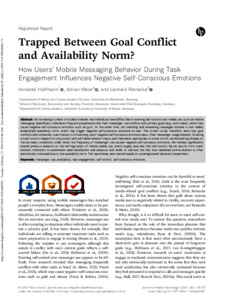|
Trapped between goal conflict and availability norm? How users’ mobile messaging behavior during task engagement influences negative self-conscious emotions
Halfmann, Annabell
;
Meier, Adrian
;
Reinecke, Leonard
![[img]](https://madoc.bib.uni-mannheim.de/64409/1.hassmallThumbnailVersion/halfmann-et-al-2023-trapped-between-goal-conflict-and-availability-norm.pdf)  Vorschau |
|
PDF
halfmann-et-al-2023-trapped-between-goal-conflict-and-availability-norm.pdf
- Veröffentlichte Version
Download (968kB)
|
|
DOI:
|
https://doi.org/10.1027/1864-1105/a000381
|
|
URL:
|
https://econtent.hogrefe.com/doi/full/10.1027/1864...
|
|
URN:
|
urn:nbn:de:bsz:180-madoc-644098
|
|
Dokumenttyp:
|
Zeitschriftenartikel
|
|
Erscheinungsjahr:
|
2024
|
|
Titel einer Zeitschrift oder einer Reihe:
|
Journal of Media Psychology
|
|
Band/Volume:
|
36
|
|
Heft/Issue:
|
1
|
|
Seitenbereich:
|
45-57
|
|
Ort der Veröffentlichung:
|
Göttingen
|
|
Verlag:
|
Hogrefe & Huber
|
|
ISSN:
|
1864-1105 , 2151-2388
|
|
Sprache der Veröffentlichung:
|
Englisch
|
|
Einrichtung:
|
Philosophische Fakultät > Medien- und Kommunikationswissenschaft (Naab 2022-)
|
|
Bereits vorhandene Lizenz:
|
 Creative Commons Namensnennung, nicht kommerziell 4.0 International (CC BY-NC 4.0) Creative Commons Namensnennung, nicht kommerziell 4.0 International (CC BY-NC 4.0)
|
|
Fachgebiet:
|
150 Psychologie
|
|
Abstract:
|
An increasing number of studies indicate that individuals have difficulties in exerting self-control over media use, such as mobile messaging. Specifically, individuals frequently experience that their messenger use conflicts with primary goals (e.g., work tasks), which may cause negative self-conscious emotions such as guilt. At the same time, not checking and answering messages violates a now widely established availability norm, which may trigger negative self-conscious emotions as well. The current study, therefore, tests how goal conflicts and connection cues interact in influencing users’ negative self-conscious emotions about their messenger usage behavior. Drawing on self-control research in conjunction with self-determination theory and theoretical approaches to social norms, we derived hypotheses on the boundary conditions under which the frequency of messenger use causes negative self-conscious emotions. We thereby significantly extend previous research on the self-regulation of mobile media use, which largely assumes that self-control failure results from users’ intrinsic motivation to experience need satisfaction and pleasure and tends to overlook the fact that mediated communication is often extrinsically motivated due to the availability norm. The hypotheses were tested based on a preregistered laboratory experiment.
|
 | Dieser Eintrag ist Teil der Universitätsbibliographie. |
 | Das Dokument wird vom Publikationsserver der Universitätsbibliothek Mannheim bereitgestellt. |
 Suche Autoren in Suche Autoren in
Sie haben einen Fehler gefunden? Teilen Sie uns Ihren Korrekturwunsch bitte hier mit: E-Mail
Actions (login required)
 |
Eintrag anzeigen |
|
|
 ORCID: 0000-0001-5073-9709 ; Meier, Adrian
ORCID: 0000-0001-5073-9709 ; Meier, Adrian  ORCID: 0000-0002-8191-2962 ; Reinecke, Leonard
ORCID: 0000-0002-8191-2962 ; Reinecke, Leonard



 Creative Commons Namensnennung, nicht kommerziell 4.0 International (CC BY-NC 4.0)
Creative Commons Namensnennung, nicht kommerziell 4.0 International (CC BY-NC 4.0) Suche Autoren in
Suche Autoren in